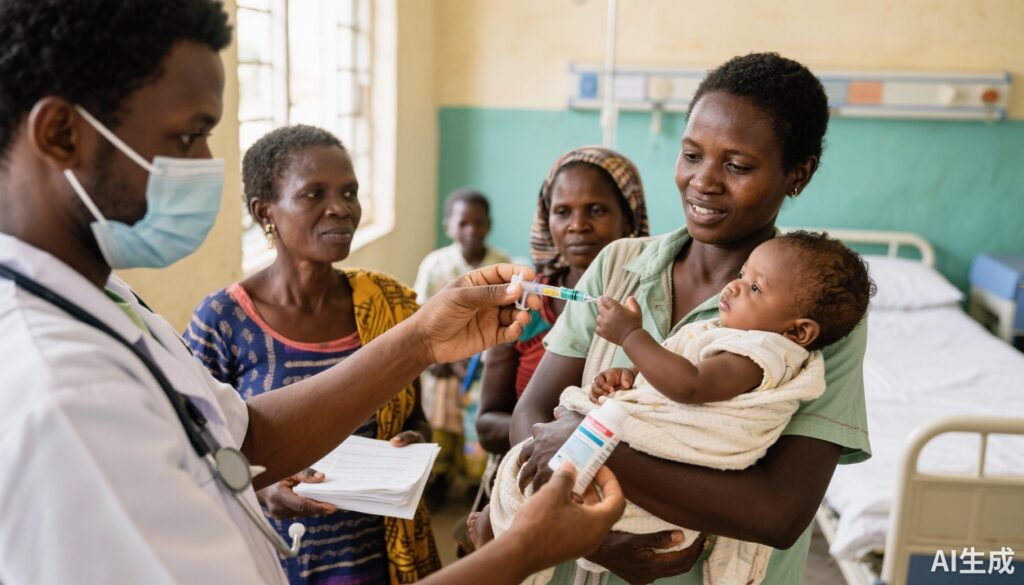Highlight
- Switching from injectable to oral antibiotics after 48 hours is safe and effective for young infants with moderate-risk possible serious bacterial infection (PSBI).
- Early hospital discharge reduces inpatient stay duration without increasing poor clinical outcomes, including mortality and severe infection signs.
- High treatment adherence to oral amoxicillin was achieved across diverse low- and middle-income countries, supporting feasibility.
- This strategy may optimize health system capacity and reduce risks of hospital-acquired infections in resource-limited settings.
Study Background
Serious bacterial infections in young infants under 2 months of age remain a major contributor to neonatal morbidity and mortality globally, disproportionately affecting low-resource settings in Africa and Asia. Management guidelines recommend prolonged inpatient parenteral antibiotic therapy, typically 7 to 10 days, often requiring hospital stays that pose significant burdens on families and healthcare systems. Long hospitalizations increase risks of nosocomial infections, impede family bonding, and limit health system capacity. Exploring strategies to safely reduce inpatient duration is therefore a critical unmet need. Moderate-mortality-risk PSBI—characterized by specific clinical signs without severe critical illness—presents a patient population that may benefit from early transition from injectable to oral antibiotics alongside earlier hospital discharge.
Study Design
This open-label, multicountry, individually randomized controlled trial was conducted across Bangladesh, Ethiopia, India, Nigeria, Pakistan, and Tanzania. Eligible participants were young infants aged 1 to 59 days presenting with moderate-mortality-risk signs of PSBI. All enrolled infants initially received inpatient treatment with injectable ampicillin and gentamicin. After 48 hours, infants who had no PSBI signs and a negative C-reactive protein test were randomized to either:
- The intervention (outpatient) group: injectable antibiotics discontinued; switched to oral amoxicillin twice daily for five more days; discharged from hospital.
- The control group: continued full 7-day inpatient injectable antibiotic therapy.
Primary outcome was a hierarchical composite measure of poor clinical outcome, including death by day 15, signs of critical illness by days 4 or 8, other serious infection signs by days 4 or 8, and clinical severe infection signs on day 8. The non-inferiority margin for the outpatient group compared to inpatient care was set at 2%. A per-protocol analysis evaluated outcomes, with treatment adherence defined as receiving at least 80% of antibiotic doses.
Key Findings
Between June 2021 and August 2024, 6549 eligible young infants were reassessed after 48 hours, with 5253 infants randomized: 2635 to the outpatient group and 2618 to the continued inpatient care group. Treatment adherence was robust in both groups (96.7% for oral amoxicillin and 95.7% for continued inpatient injectables).
In the per-protocol analysis, the poor clinical outcome rate was 4.0% (105/2616) in the outpatient group versus 3.5% (90/2603) in the inpatient care group; risk difference was 0.56% (95% CI, -0.47% to 1.58%), falling within the predefined non-inferiority margin. Deaths were rare and comparable between groups (0.2% vs 0.3%). Most adverse outcomes were due to clinical severe infection signs detected on day 8 (3.4% outpatient vs 2.6% inpatient). Serious adverse events besides death were very infrequent and occurred only in the inpatient group.
These findings demonstrate that early hospital discharge after switching to oral antibiotics did not compromise safety or effectiveness compared to standard prolonged inpatient therapy. The large sample size and geographic diversity strengthen the generalizability to similar low-resource settings.
Expert Commentary
This landmark trial addresses a critical gap in neonatal infection management by rigorously evaluating a feasible and clinically relevant approach to reduce prolonged hospitalization. Early switch to oral amoxicillin after initial injectable therapy balances efficacy and safety with health system optimization. Previous smaller studies suggested safety of oral transition, but this trial’s robust design and large international cohort provide definitive evidence supporting integration into policy guidelines.
The main limitation includes the open-label design, which could influence some outcome assessments; however, objective endpoints such as mortality and defined clinical signs mitigate bias. Notably, C-reactive protein negativity and absence of infection signs guided safe patient selection for discharge, which may require local laboratory capacity to implement effectively. Further research may explore even earlier transition or outpatient initiation strategies.
The biological plausibility rests on the high bioavailability and proven efficacy of oral amoxicillin in neonatal infections and the clinical improvement seen after initial injectable therapy, allowing step-down care. This strategy could reduce hospital-acquired infection risks, economic burdens, and improve family-centered care.
Conclusion
This multicountry open-label RCT demonstrates that in young infants with moderate-mortality-risk PSBI, switching from injectable to oral antibiotics after 48 hours of inpatient therapy, coupled with early hospital discharge, is non-inferior to standard prolonged inpatient injections. Adoption of this evidence-based approach would better utilize scarce health resources, decrease inpatient exposure, and maintain excellent clinical outcomes across diverse low- and middle-income settings. Policymakers and clinicians should consider implementing protocolized early discharge with oral step-down therapy for appropriate young infants with PSBI.
Funding and Clinical Trial Registration
The study was funded by the Bill & Melinda Gates Foundation. It is registered in the ISRCTN registry under the identifier ISRCTN16872570.
Reference
PSBI Study Group. Switching antibiotic therapy from injectable to oral to optimise the duration of inpatient care for young infants presenting with moderate-mortality-risk signs of possible serious bacterial infection: an open-label, multicountry, randomised controlled trial. Lancet Glob Health. 2025 Nov;13(11):e1903-e1913. doi: 10.1016/S2214-109X(25)00311-0. PMID: 41109261.



